Genetic association between FADS and ELOVL polymorphisms and the circulating levels of EPA/DHA in humans: a scoping review
- PMID: 38844860
- PMCID: PMC11157910
- DOI: 10.1186/s12263-024-00747-4
Genetic association between FADS and ELOVL polymorphisms and the circulating levels of EPA/DHA in humans: a scoping review
Abstract
Background: Docosahexaenoic acid (DHA) and eicosapentaenoic acid (EPA) are two omega-3 fatty acids that can be synthesized out of their precursor alpha-linolenic acid (ALA). FADS and ELOVL genes encode the desaturase and elongase enzymes required for EPA and DHA synthesis from ALA; however, single nucleotide polymorphisms (SNPs) in FADS and ELOVL genes could modify the levels of EPA and DHA synthesized from ALA although there is no consensus in this area. This review aims to investigate EPA and DHA circulating levels in human blood and their association with FADS or ELOVL.
Methods: PubMed, Cochrane, and Scopus databases were used to identify research articles. They were subsequently reviewed by two independent investigators.
Results: Initially, 353 papers were identified. After removing duplicates and articles not meeting inclusion criteria, 98 full text papers were screened. Finally, this review included 40 studies investigating FADS and/or ELOVL polymorphisms. A total of 47 different SNPs in FADS genes were reported. FADS1 rs174537, rs174547, rs174556 and rs174561 were the most studied SNPs, with minor allele carriers having lower levels of EPA and DHA. SNPs in the FADS genes were in high linkage disequilibrium. SNPs in FADS were correlated with levels of EPA and DHA. No conclusion could be drawn with the ELOVL polymorphisms since the number of studies was too low.
Conclusion: Specific SNPs in FADS gene, such as rs174537, have strong associations with circulating levels of EPA and DHA. Continued investigation regarding the impact of genetic variants related to EPA and DHA synthesis is warranted.
Keywords: ELOVL; FADS; DHA; EPA; SNP.
© 2024. The Author(s).
Conflict of interest statement
The authors declare no competing interests.
Figures
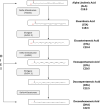
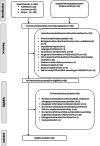
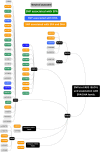
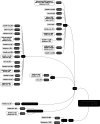
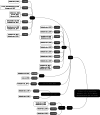
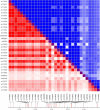
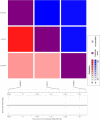
Similar articles
-
Association of maternal weight with FADS and ELOVL genetic variants and fatty acid levels- The PREOBE follow-up.PLoS One. 2017 Jun 9;12(6):e0179135. doi: 10.1371/journal.pone.0179135. eCollection 2017. PLoS One. 2017. PMID: 28598979 Free PMC article.
-
Dietary oils and FADS1-FADS2 genetic variants modulate [13C]α-linolenic acid metabolism and plasma fatty acid composition.Am J Clin Nutr. 2013 Jan;97(1):195-207. doi: 10.3945/ajcn.112.043117. Epub 2012 Dec 5. Am J Clin Nutr. 2013. PMID: 23221573 Clinical Trial.
-
Erythrocyte polyunsaturated fatty acid composition is associated with depression and FADS genotype in Caucasians.Nutr Neurosci. 2018 Oct;21(8):589-601. doi: 10.1080/1028415X.2017.1327685. Epub 2017 May 29. Nutr Neurosci. 2018. PMID: 28552045
-
The impact of fatty acid desaturase genotype on fatty acid status and cardiovascular health in adults.Proc Nutr Soc. 2017 Feb;76(1):64-75. doi: 10.1017/S0029665116000732. Epub 2016 Aug 16. Proc Nutr Soc. 2017. PMID: 27527582 Review.
-
Genetic variation in FADS genes is associated with maternal long-chain PUFA status but not with cognitive development of infants in a high fish-eating observational study.Prostaglandins Leukot Essent Fatty Acids. 2015 Dec;102-103:13-20. doi: 10.1016/j.plefa.2015.08.004. Epub 2015 Sep 14. Prostaglandins Leukot Essent Fatty Acids. 2015. PMID: 26474818 Free PMC article. Review.
Cited by
-
Fatty Acid Desaturase: The Yin or Yang of Disease Pathology.Mol Diagn Ther. 2025 Jun 30. doi: 10.1007/s40291-025-00796-4. Online ahead of print. Mol Diagn Ther. 2025. PMID: 40587082 Review.
-
Myokine Circulating Levels in Postmenopausal Women with Overweight or Obesity: Effects of Resistance Training and/or DHA-Rich n-3 PUFA Supplementation.Nutrients. 2025 Aug 5;17(15):2553. doi: 10.3390/nu17152553. Nutrients. 2025. PMID: 40806137 Free PMC article. Clinical Trial.
-
Nutrigenetics and Omega-3 and Gamma-Linolenic Acid Intake and Status in Patients with Cancer: A PRISMA Scoping Review of Research Trends and Challenges.Int J Mol Sci. 2025 May 19;26(10):4867. doi: 10.3390/ijms26104867. Int J Mol Sci. 2025. PMID: 40430008 Free PMC article.
-
Effects of polyunsaturated fatty acids on gastric cancer immunity and immunotherapy.Sci Rep. 2025 Jun 6;15(1):19891. doi: 10.1038/s41598-025-97644-6. Sci Rep. 2025. PMID: 40481119 Free PMC article.
-
Plasma Fatty Acid Profiling and Mathematical Estimation of the Omega-3 Index: Toward Diagnostic Tools in Atherosclerosis and Statin Therapy Monitoring.Biomedicines. 2025 Jun 4;13(6):1383. doi: 10.3390/biomedicines13061383. Biomedicines. 2025. PMID: 40564102 Free PMC article.
References
-
- Coltell O, Sorlí JV, Asensio EM, Barragán R, González JI, Giménez-Alba IM, et al. Genome-Wide Association Study for Serum Omega-3 and Omega-6 Polyunsaturated Fatty Acids: Exploratory Analysis of the Sex-Specific Effects and Dietary Modulation in Mediterranean Subjects with Metabolic Syndrome. Nutrients. 2020;12(2):E310. doi: 10.3390/nu12020310. - DOI - PMC - PubMed
Publication types
LinkOut - more resources
Full Text Sources
Research Materials

